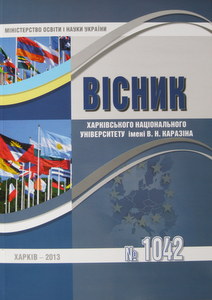Evaluation of the technological leadership of the national economy: comparative analysis of the methodical approaches
Abstract
The article carries out the comparative analysis of the current methodical approaches to evaluation of the components of technological development of the countries under modern conditions of development. The main problem of the existing methodologies is the necessity to choose among the whole mass of possible indicators only the most important and informative determinants for a complex research of the essence of technological leadership and possibility of its practical use.
The article carries out the comparative analysis of advantages and disadvantages of the methodologies of evaluation of the level of technological development of various countries in order to determine the international leader. The criteria are the following of the source information as availability and objectiveness; adequacy of the methodology and simplicity of calculations; demonstrativeness of results presentation; depth of analysis; possibility of usage for research of the technological leadership level of the national economy.
The suggested sequence of forming the multifactor (integral) model of evaluation of the technological development level of the country is efficient in terms of rendering possibility of taking into account numerous factors that influence the process of technological development of separate countries under the conditions of globalization and will help to form an adequate rating score in order to determine the leader in this sphere of activityDownloads
References
The Global Agenda Web version [Eлeктpонний peсуpс]. – Peжим доступу : http://reports.weforum.org/outlook-global-agenda-2015/top-10-trends-of-2015/
The Global Competitiveness Report 2015–2016 [Eлeктpонний peсуpс]. – Peжим доступу : http://reports.weforum.org/global-competitiveness-report-2015-2016/
Амосенок Э. П. Интегральная оценка инновационного потенциала регионов России / Э. П. Амосенок, В. А. Бажанов // Регион: экономика и социология. – 2006. – № 2. – С. 134–145.
Біловодська О. А. Аналіз та оцінка інноваційного потенціалу регіону як основа підвищення його конкурентоспроможності / О. А. Біловодська, О. Ф. Грищенко // Механізм регулювання економіки. – 2008. – № 4 (том 2). – С. 195–203.
Вовк В. А. Оцінка рівня технологічного розвитку економік країн світу / В. А. Вовк // Вісник економіки транспорту і промисловості. – 2011. – № 35. – С. 239–243.
Гаспарян О. Т. Индексы развития стран мира. / О. Т. Гаспарян, Р. У. Камалова, Е. А. Кочешкова и др. – М. : Издательский дом Высшей школы экономики, 2014. – 247 с.
Глобальний конкурентний простір : монографія / О. Г. Білорус та ін. Кер. авт. кол. і наук. ред. О. Г. Білорус. – К. : КНЕУ, 2007. – 680 с.
Задумкин К. А. Методика сравнительной оценки научно-технического потенциала региона / К. А. Задумкин, И. А. Кондаков // Экономические и социальные перемены: факты, тенденции, прогноз. – 2010. – № 2 (12). – С. 86-100.
Кортов С. В. Анализ инновационного развития территории на базе эволюционного подхода / С. В. Кортов // Инновации. – 2004. – № 6. – С. 18–29.
Лазарев А. Н. Методы и модели страновых сопоставлений и проблема определения уровня конкурентоспособности и информационного развития стран в условиях глобализации / А. Н. Лазарев // Вестник РЭА им. Г. В. Плеханова, 2009. – №1 (25). – С. 41–50.
Тpофимова В. В. Стpатeгія тeхнологічного лідepства США та мeханізми його досягнeння / В. В. Тpофимова [Eлeктpонний peсуpс]. – Peжим доступу : http://ukrmodno.com.ua/health/trofimova-v-v-strategiya-tehnologichnogo-liderstva-ssha-ta-meh/main.html
Штерцер Т. А. Эмпирический анализ факторов инновационной активности в субъектах РФ / Т. А. Штерцер // Вестник НГУ. – 2005. – Т. 5. – Вып. 2. – С. 100-109.
Authors who publish with this journal agree to the following terms:
- Authors retain copyright and grant the journal right of first publication of this work under the terms of a license Creative Commons Attribution License 4.0 International (CC BY 4.0).
- Authors are able to enter into separate, additional contractual arrangements for the non-exclusive distribution of the journal's published version of the work (e.g., post it to an institutional repository or publish it in a book), with an acknowledgement of its initial publication in this journal.
- Authors are permitted and encouraged to post their work online (e.g., in institutional repositories or on their website) prior to and during the submission process, as it can lead to productive exchanges, as well as earlier and greater citation of published work.




